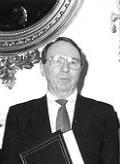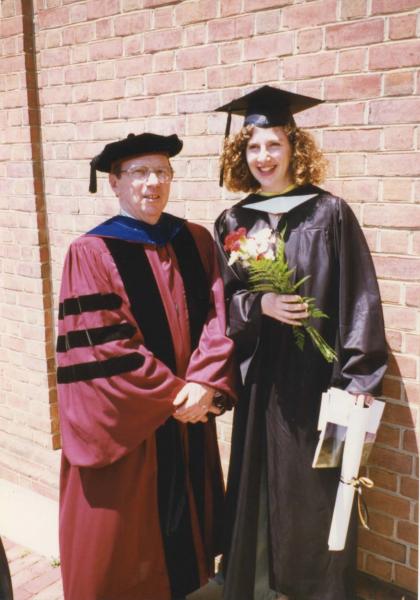- About Archives
- About SAA
- Careers
- Education
- Publications
- Advocacy
- Membership
 Dr. Frank G. Burke, 88, acting Archivist of the United States from 1985-1987, died in Annapolis, MD, on November 30, 2015. He had been ill with Alzheimer's disease.
Dr. Frank G. Burke, 88, acting Archivist of the United States from 1985-1987, died in Annapolis, MD, on November 30, 2015. He had been ill with Alzheimer's disease.
Born in 1927 in Queens, NY, he joined the US Navy in the waning days of WWII, serving as a radar and ground control approach operator, which led to an early career as a radio operator for airlines such as TWA, Northwest Orient, and tiny Wien Alaska Airlines in Point Barrow, Alaska. He also had occasional stints DJ-ing for commercial radio stations.
While working for the Civil Aeronautics Administration in Fairbanks in the early 1950s, Burke did undergraduate coursework at the University of Alaska, later enrolling at the University of Chicago, where he earned an MA in 1959 and PhD in 1969 in history.
A job as an assistant curator for Archives and Manuscripts at the University of Chicago Library led to a position at the Library of Congress in the manuscripts division, where he helped develop SPINDEX, an automated control system employing one of the Library's first mainframe computers. Later, as special assistant for information retrieval at the National Archives, Burke was instrumental in developing SPINDEX II, an automated control system designed more specifically to index archival collections.
In 1968 Burke became assistant archivist for educational programs at the National Archives, where he was responsible for managing public programs, exhibits, and publications such as the quarterly journal Prologue. During his tenure he also oversaw the Archives' extensive preparations for the 1976 Bicentennial celebrations.
As executive director of the National Historical Publications and Records Commission (NHPRC) from 1975 to 1984 and again from 1987 to 1988, Burke was instrumental in the early promotion of archives' use of computers to describe and control materials, a contribution that affected the archival profession as a whole.
In 1985 Burke became acting Archivist of the United States following Robert Warner's retirement, a position he held until Don W. Wilson's appointment in 1987.
After a brief return to NHPRC, Burke became professor of library and information services at the University of Maryland's College of Library and Information Services, where he was also the coordinator of the History and Library Sciences Dual Degree (HiLS) Program. During his tenure at UMD he was also instrumental in working to obtain the site for Archives II.
A Fellow and past president of SAA, Burke also contributed several articles to The American Archivist. A lover of jazz, he wrote, narrated, and selected material for "The Sounds of History," an audio cassette that featured materials from the National Archives' audio collection.
Memorial donations may be made in Burke's name to www.giving.umd.edu (select "other giving opportunity," select "give now," and search Frank G. Burke) or by check to The University of Maryland Foundation (please write "Frank G. Burke Fellowship" on the memo line): University of Maryland, Office of Gift Acceptance, 4603 Calvert Road, College Park, MD 20740.
—Submitted by Margaret Burke
(Photo by Amy Young, NARA, 1998.)
I had Dr. Burke as my advisor at the University of Maryland just before he retired. He cheerfully exhorted “mid-career” students like myself going for their second graduate degree to “stop being students,” finish up, and get a job. More good advice for an archivist: “Know enough technical information not to get snowed.” Joking aside, how fortunate I was to have known this kind and wise man and to have had him and his colleagues Marilyn Pettit, Mike Miller, and Michael Kurtz as teachers of archival methodology and practice.
Margaret Welch, Univ. of Md. 1996
Dr. Burke was my advisor, employer, and mentor during my time at the University of Maryland's College of Information Studies. I was initially hired by him in 1994 to assist with formatting footnotes for "Research and the Manuscript Tradition." It was a crash course in the Chicago Manual, a DOS Word-processing system, and his own unique method for editing and reviewing, some of which I continue to use to this day. He was the most engaging professor I encountered throughout my entire graduate career, and really cared about the students and our education and careers. Like Jodi, I remember the gatherings he hosted at his house with his delightful wife, and how welcoming he was, in general. He taught me so much, and I can say that without him, I am not sure I would have had such a meaningful archival career. He may be physically gone from the world, but he will remain in my memory for my lifetime.
Jennie Levine Knies
I first met Frank in 1980 as a student in his Manuscripts Administration class at College Park. His teachings and scholarship on the subject formed the basis of my thinking about manuscripts administration and the manuscripts tradition in the United States. He steered me in my career choices to work in manuscript repositories.
He was truly a great mentor and supporter. In my work at Gallaudet University, he helped guide me in my first successful NHPRC proposal. When we requested the return of the University's archival records from NARA, which was first soundly rejected, he helped me strategize a successful second request to Bob Warner. He also supported my subsequent candidacy to positions at other institutions.
Frank had a sharp mind and a genuine interest in the success of the profession and of fellow archivists. I will always remember him for his warmth and charm, and as the most important person to influence my professional career.
David de Lorenzo, Bancroft Library, UC Berkeley
Many thanks for posting this very nice tribute. I remember Dr Burke fondly as I worked at NARA while he served as Acting Archivist of the United States and earlier in other positions. Small correction. He was not a presidentially appointed, Senate confirmed Archivist of the United States. He did serve as Acting Archivist during a long interregnum between presidential appointees. https://www.archives.gov/about/history/archivists/
Good public servant who contributed a great deal to the National Archives and the archival profession as a practitioner and an educator.
Maarja Krusten
Thanks for the correction, Maarja! I've updated the post.
-Abigail
Dr. Burke was my advisor in the University of Maryland's HiLS (History and Library Science dual degree program) in 1993-1996. I couldn't have attended the program at a better time: Frank provided the perspective of a Ph.D historian who had served extensively in federal agencies, and the other archives professor in the program, Marilyn Pettit, provided hands-on, practical workshops. Together, they prepared us all for the major transitions in the profession since.
Frank was at least retirement age then but looked like and had the energy of a 50 year old. Frank was at the forefront of archival automation as NUCMC went to a computer index, and the administrative history of automation and description that he laid out in his lectures stays with me to this day as the manager of a consortial-level Encoded Archival Description program. I frequently have to explain or give context to the reasons why archival description is different, and it's the stories of Frank's career that provide that basis. And, as he always pointed out, NUCMC would also be an excellent name for a Siberian Husky.
Under Frank's direction, I started Student Archivists at Maryland (SAM), the SAA student chapter. He called me into his office one day and said that he'd like me to start the chapter. I had never served in any leadership role and was unsure of how to go about this project. "Make sure there are always snacks at meetings," he said. Excellent advice, and one that I obey to this day. I'm pleased to know that SAM is still going strong!
Frank had all of his graduate students over to his Annandale, VA, home every fall celebrate Oktoberfest. His charming wife, Hildegarde, would greet us at the door in her German dirndil skirt and blouse, and we'd enjoy an evening of beer and bratwurst in a home filled with interesting and creative projects--and dogs, none of whom were named NUCMC.
In spring of 1996, just before I graduated, I chaired a fundrasier in Frank's name for scholarships to the University of Maryland's College of Library and Information Science. Several hundred people gatheerd at the National Archives in College Park to hear his favorite music, classic New Orleans jazz, and to honor his substantial contributions to the profession. We raised $1500 that night--and it was the first of many fundraisers since!
How many other Frank stories can we recall? That he spent time as a radio operator in Alaska? That he spent a summer in Helena, MT, reading the contents of the Carnegie Library? That the man who went on to earn a Ph.D in history attended the University of Chicago chose that school because it was close to the airport, where he worked? He was a fine storyteller--and after all, stories are what we are all about.
I last saw Frank and Hildegarde about 2007, when I was in DC to do some work at NEH. They made a dream come true by inviting me to the Cosmos Club for dinner. I had walked by and gazed on that ornate structure many times as a graduate students but never dreamed I'd dine there. By then, he had stopped going to archives meetings and NARA gatherings because he was having trouble remembering names, and that was emabarrassing to him. But they were both more than happy to have an evening of conversation about work and life. They were a beautiful couple who enjoyed many happy years together.
He was a humble man from humble beginnings. His encouragement launched many a career, and I know that he took immense satisfaction in that, more satisfaction than in his own substantial accomplishments. I will always be grateful to have known him and more grateful to count him among my most important menetors and friends.
Thank you, Frank.
